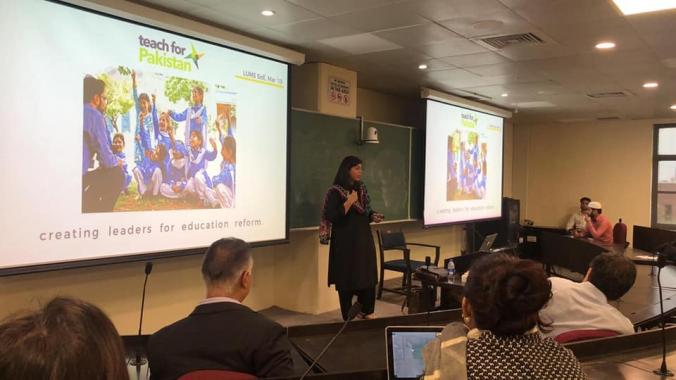
LUMS Syed Ahsan Ali and Syed Maratib Ali School of Education organised the second presentation session under the SOE Models of Educational Innovation Series. The presentation was carried out by Khadija Shahper Bakhtiar, Founder and Chief Executive Officer of Teach For Pakistan. The session was attended by the Dr. Tahir Andrabi, Dean SOE, SOE faculty and MPhil ELM students.
Teach For Pakistan is a non-profit company that is building a national movement to end educational poverty. Khadija Shahper Bakhtiar first had the idea to launch Teach For Pakistan when she was studying as a Fulbright scholar at the Goldman School of Public Policy, University of California, Berkeley. She came across Alumni of Teach For America, the programme that pioneered a model that has since been adapted to 49+ countries, including Pakistan. Inspired by the journey, impact and conviction of Teach For America alumni to lead change in their context, Ms. Shahper returned to Pakistan to launch a similar model locally. She has also led Teach For All’s teacher and alumni development work in the Middle East, South Asia and Africa regions.
The session started with the introduction of the organisation, followed by the presentation on its scale of operation and impact. Ms. Shahper talked about how the organisation provides the nation's top graduates with the opportunity and support to teach for two years in low-income communities through a structured fellowship, and develop the skills and convictions to lead education reform across social and economic systems.
Currently operating out of Islamabad, in partnership with the Federal Directorate of Education, the organisation’s 120 Fellows and Alumni have taught and changed lives for over 6,000 children across 48 government, low-cost private and non-profit schools, and benefited over 20,000 community members through parental engagement, community development initiatives and training other school teachers.
Teach For Pakistan's Alumni - about a fourth of whom are LUMS graduates - have gone on from the fellowship to collectively affect system-wide reform: turning around government schools, managing entire school regions, re-writing curricula and textbooks for Punjab, designing merit-based teacher recruitment systems in Sindh, and mobilising resources for education from the corporate sector. Given the impact, they are witnessing in schools and at the system level, the organisation is aiming to grow their numbers aggressively in coming years and scale nationwide.
While informing the audience about the fellowship program, Ms. Shahper elaborated that the organisation places fellows in under-performing schools in select communities, prioritising long-term relationships with placement schools for a greater impact on the communities. Schools are selected based on household income level, student needs and the condition of the school.
The programme aims to build foundational knowledge and skills for independent learning. The learning outcomes of the students are determined by National Curriculum Benchmarks as well as international research evidence for student success. The programme also attempts to enhance non-cognitive learning abilities and the outcomes are determined through Teach For Pakistan’s own experience by measuring factors like compassion, critical thinking, and independent learning.
The session was interactive and engaging with meaningful exchanges among the students, TFP representatives and the SOE faculty. Many topics were discussed in the QandA session such as the issue of fellow retention, impact measurement of the project, student cognitive development, post-fellowship impact, and operationalisation of the framework.








